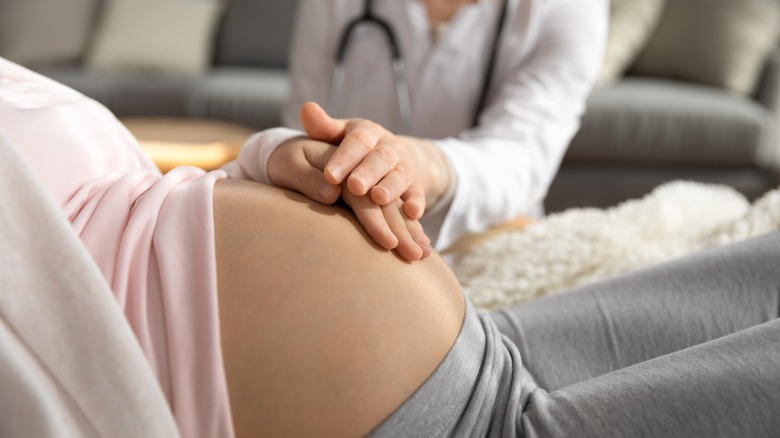How Alcohol And Coffee Can Affect The Outcome Of Fertility Treatments
For many couples, the journey to pregnancy isn't an easy one. In fact, data shows that of those who are in the reproductive age group, 9% of men and around 11% of women have experienced fertility problems, per National Institutes of Health, and the issue can impact anyone. Celebrities who have struggled with infertility include Nicole Kidman, Chrissy Teigen, Elizabeth Banks, Hugh Jackman, and Jimmy Fallon, just to name a few. Many of them have turned to fertility treatments, including in vitro fertilization (IVF), in order to fulfill their dream of becoming a parent.
IVF is a procedure that begins by removing a woman's eggs from her ovaries and then fertilizing them outside of the body. According to the Duke Fertility Center, "The eggs are fertilized either by placing sperm on the eggs or by injecting a single sperm into each egg using a technique referred to as 'intracytoplasmic sperm injection' (ICSI)." When visiting a fertility clinic for the first time, couples will usually be advised on lifestyle changes they can make to help boost their chances of success, including reducing stress and maintaining a weight that's healthy, per Parents.
Of course, women are also educated on what they can and cannot consume during pregnancy. Your diet can make an impact on your chances of IVF success as well, but do studies on two things women are told to avoid when with child — alcohol and caffeine — show to have an impact on the health of their baby before conception as well?
Alcohol can hinder success of fertility treatments, but caffeine has no impact
New research has found that while caffeine consumption doesn't have an impact on the success of fertility treatments, drinking alcohol regularly can reduce the chances of getting pregnant and having a live birth after fertility treatments.
The research, which was published in Acta Obstetricia et Gynecologica Scandinavica, evaluated 16 studies and found that even low or moderate alcohol consumption in both men and women is associated with decreased fertility during in vitro fertilization (IVF) or intracytoplasmic sperm injection (ICSI) treatment. The study found that alcohol can cause hormonal imbalances, impact the health of the uterus, and decrease sperm quality. "[W]hen the woman consumes alcohol, there is a decreased chance of achieving pregnancy. When the male partner consumes alcohol, there is an increased risk of miscarriage," says Becca Romero, a clinical nutritionist, fertility specialist, and owner of Little Life Nutrition, told Healthline. She added: "It is clear that alcohol can have a negative impact on the ability to achieve pregnancy and it is not worth the risk for a few drinks."
The data also showed that despite the fact that women are told to avoid or limit caffeine during pregnancy, consuming it didn't have a significant impact for women during fertility treatments, especially when it was taken in small doses. "Overall, moderation is key to optimize general health and well-being before pregnancy," Dr. Brindha Bavan, a reproductive medicine and fertility specialist at Stanford Medicine Children's Health, told Healthline.

